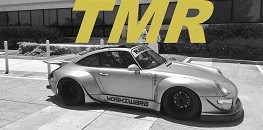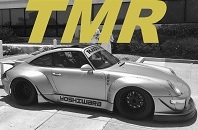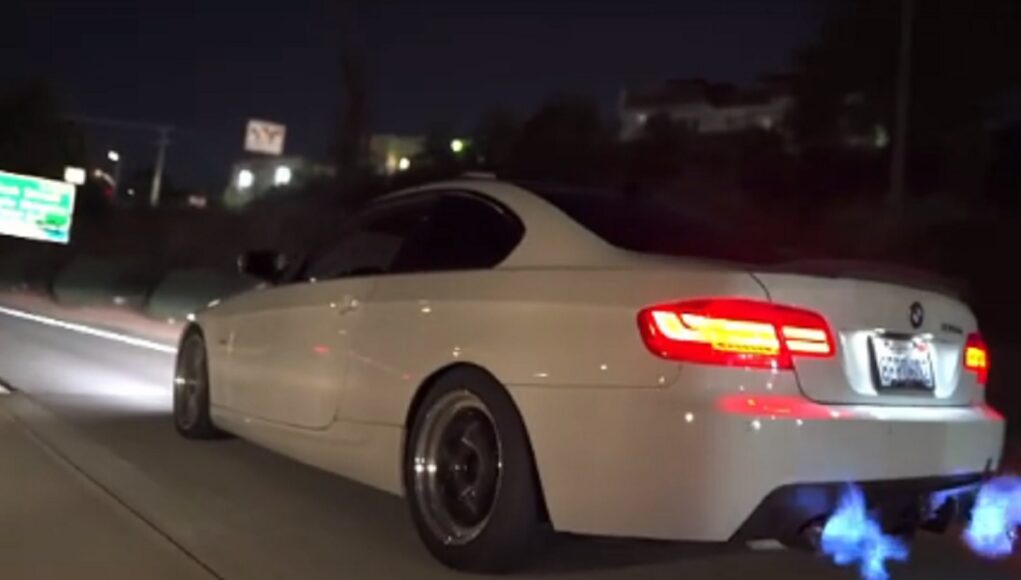When done correctly, crackle tunes are a fun way to add loud pops and bangs out of your exhaust.
If you’ve ever quickly blipped your gas pedal while letting off the throttle, you might hear a loud exhaust pop. Alternatively, you might drive an older car, given it some gas and heard a backfire out of your tailpipe.
Here’s an example of a crackle tune on this 370Z.
When naturally aspirated and turbo engines are tuned correctly, either from the factory or for performance, engineers and tuners try to minimize these popping and banging events from happening.
During the proper an engine cylinder’s four stages of combustion: intake, compression, combustion, and exhaust (AKA suck, squeeze, bang, blow) proper ignition happens at near the top of a piston’s travel. At that point, an air and fuel mixture explosion will deliver the most power downward.
But, if you trick an engine by delivering too much fuel during deceleration with the aforementioned blip of the throttle (AKA lift-off throttle overrun or exhaust overrun) or purposely tune an engine’s ignition sequence to happen not at TDC but slightly after TDC, when your exhaust valves are opening, you’ll have a rich fuel mixture combust and exit out through the exhaust phase making its way into your exhaust pipe. The combustion comes out as heat and noise, making those cracks, bangs, and pops.
Crackle tunes for naturally aspirated cars are essentially that, adjusting the ignition timing, amount of fuel, and tuning of your ECU to safely achieve combustion slightly after Top Dead Center.
Are there crackle tunes for turbocharged cars?
Crackle tunes for turbo cars operate under the same principle as Naturally Aspirated crackle tunes except, programmed with the wastegate open, none of that extra exhaust builds up boost.
But, when specific tunes are used to reduce turbo lag by delaying ignition timing when you’re off the throttle, pushing a richer mixture of air and fuel to combust in the exhaust manifold before the turbo, we call such a system anti-lag.
There are a handful of popular anti-lag systems and I encourage you to watch the below video to learn more.
Dangers of crackle tunes
Crackle tunes serve no functional purpose, in no way benefits the car and is purely for fun. Done incorrectly, crackle tunes will add additional burning to your valves, send rich mixtures through your catalytic converters ruining them, and can shorten the life of your turbos drastically.
If you have concerns about engine damage and you are new to tuning, crackle tunes aren’t for you. However, if you have advanced engine tuning skills or know someone experienced tuning engines, crackle tunes can be safe.
Crackle tunes are so popular, tuners who once tuned cars to make more power make more money making just crackle tunes.
How are crackle tunes made?
Crackle tunes on modern cars are done by reprogramming your car’s OEM ignition maps so, during deceleration, ignition events happen after the normal time. This is done with an aftermarket ECU tuner like Ktuner or Hondata.
First, a tuner will adjust the car’s factory ignition timing maps, retarding ignition drastically in the lower RPM range (anywhere from 0-2000 RPM) only during deceleration. But, without additional fuel added, there are no loud bangs or pops…yet.
You can add additional fuel manually by blipping the throttle on deceleration. By using different ignition retard values, you can achieve different types bangs and pops.
You can also adjust what’s called the fuel cut delay or how long the delay is before fuel injectors shut off during deceleration. Normal fuel injectors shut off at about 40 milliseconds off throttle. A crackle tune pumps those numbers up to about 1000ms, 1500ms or 2000ms (1, 1.5, and 2 seconds respectively.)
With additional combined with retarded ignition timing you get more uniform and consistent bangs, pops, and exhaust crackles. You will use more fuel, lowering MPG.
I recommend watching the below video to see what I have described above in real time.
Crackle tune legality
Because crackle tunes mess with air and fuel, you’re going to inadvertently mess with your car’s emissions systems. Since most crackle tunes are done on street legal cars and not race cars, crackle tunes are in direct violation of the EPA’s Clean Air Act.
The EPA does not actively go after individual EPA Clean Air Act violators but they are going after shops that do any type of ECU tuning that affects emissions. You may be audited and fined by the EPA if you furnish and facilitate selling ECU tuners and/or tune crackle tunes for street legal vehicles.



